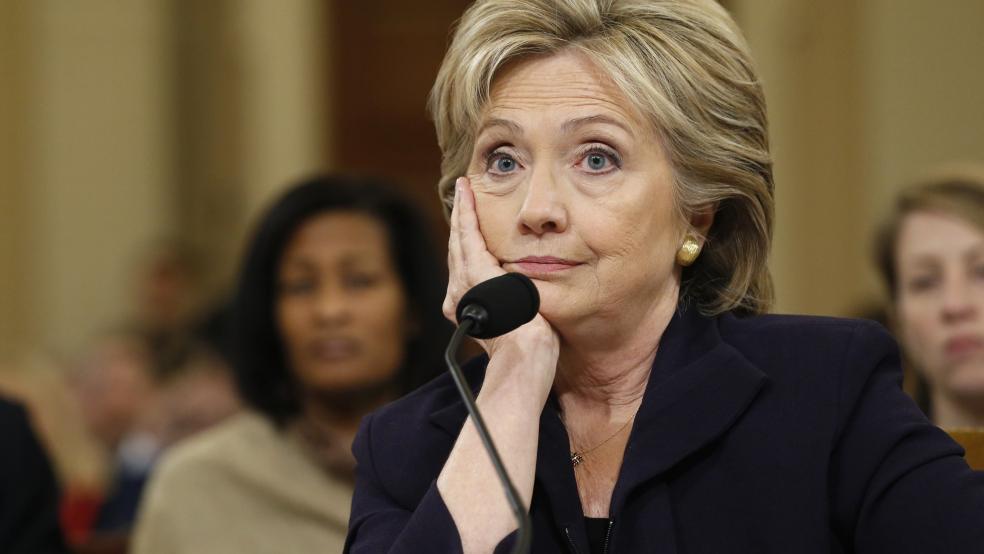Hillary Clinton heads for a major Democratic event in Iowa this weekend riding high from her strong showing in her party’s first presidential debate, a rock-solid, 11-hour performance before the House Benghazi committee and new polling showing her pulling ahead of Sen. Bernie Sanders in both New Hampshire and Iowa.
Her performances, along with Vice President Joe Biden’s decision to stay on the campaign sidelines, have combined to restore her lost luster. She is now certain to bring down the house when she appears on stage at Saturday’s Jefferson-Jackson dinner in Des Moines.
Related: An Unflappable Hillary Clinton Frustrates the Benghazi Committee
A newly released Quinnipiac University poll shows Clinton once again ahead of the pack among likely Iowa Democratic caucus participants, with 51 percent to 40 percent for Sanders. That contrasts with Clinton’s dismal showing in September, when Sanders held a narrow lead, 41 percent to 40 percent. Clinton also is making a comeback in New Hampshire, where Sanders had pulled ahead.
According to a new WBUR poll released Wednesday, Clinton is now leading Sanders in the Granite State by four percentage points, while her favorability rating is 7 points higher than it was in September.
For months Clinton struggled to cope with a controversy stoked by the GOP over her use of a personal email server during her four years as secretary of state. She also seemed at a loss to find a way to slow Sanders’ surging populist campaign, which has drawn huge crowds and campaign contributions rivaling those of Clinton.
There was a clear disconnect between Clinton’s relatively strong showing in national polls and her steady decline in support among Democrats in the early caucus and primary states. For instance, a September CNN/ORC poll showed that Clinton was backed by 42 percent of Democratic primary voters nationally, compared to 24 percent for Sanders and 22 percent for Biden if he decided to run.
Yet her standing in Iowa and New Hampshire steadily eroded, as Sanders stoked support among enthusiastic liberals and college students, and a startling number of Democrats questioned Clinton’s honesty and integrity.
The turning point came during the Oct. 13 Democratic debate, when a highly confident and polished Clinton overshadowed Sanders, former Maryland governor Martin O’Malley and the two other Democratic contenders. Sanders, the self-described Democratic socialist from Vermont, had been brilliant on the campaign stump with his calls for helping the middle class and his attacks on Wall Street’s “billionaire class.” But under the harsh glare of the television lights and aggressive questioning by moderators, Sanders came off as weak on gun control and national security, and his fascination with Denmark and other socialistic countries made his economic ideas seem quaint and out of the Democratic mainstream.
Related: Clinton Seizes Control of the Democratic Campaign
He also made it clear he had no intention of going after Clinton on her problems with her emails, declaring that the American people “are sick and tired of your damn emails!” Clinton couldn’t have been happier with Sanders’ decision to slam the door shut on that controversy for the rest of the Democratic campaign, and she shook his hand in gratitude.
Comedian Larry David later spoofed Sanders’ debate performance on “Saturday Night Live,” saying in his best Brooklyn accent: “I don’t have a super PAC. I don’t even have a backpack. I own one pair of underwear. That’s it. Some of these billionaires have three, four pairs.”
“A strong debate performance doesn’t always translate into better poll numbers, but it sure did for Hillary Clinton,” said Peter A. Brown, assistant director of the Quinnipiac University Poll. “Likely Iowa Caucus participants who watched and listened to the debate scored it two to one for the former secretary of state.”
The poll found that of the likely Democratic caucus goers who watched the debate, 62 percent said Clinton did the best job, compared to just 31 percent said Sanders won the race and 3 percent chose O’Malley. The two other Democratic candidates, former Sen. Jim Webb of Virginia and former Rhode Island governor and senator Lincoln Chafee, dropped out of the race this week.





